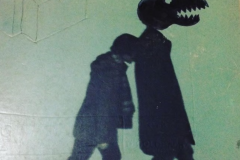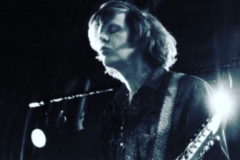Content warning: This article includes discussion of self-harming behavior, including suicide. If you’re struggling with suicidal thoughts, The National Suicide Prevention Lifeline, https://suicidepreventionlifeline.org/, 1-800-273-TALK(8255), provides 24/7, free and confidential support for people in distress.
Joseph A. Peragine’s music isn’t exactly relaxing. His songs are chaotic, non-linear, dissonant, and prone to rapid changes. They’re also impressively technical, featuring sounds not commonly heard from a solo guitarist. They radiate a creative ingenuity that transforms ugliness into beauty. As Peragine proudly boasts, his art is “The Soundtrack of Schizophrenia.”
For decades, rock musicians have bragged about how “insane” they are, in an attempt to bolster album sales. Influencers ranging from film producers to politicians have similarly exploited mental health to invoke irrational fears. These depictions are more than just inaccurate; they’re harmful to the nearly one in four people across the globe living with a mental health condition (World Health Organization, 2001). It’s part of what makes Peragine’s music so unique and urgently needed. As someone who actually has paranoid schizophrenia, he uses his art to progress both musical creativity as well as the public’s awareness of his condition.
His four-part musical anthology, Diagnosis: Schizophrenia, is a prog-metal masterpiece as well as a diary of Peragine’s lifelong struggles and triumphs over adversity. While entirely instrumental, track titles such as “That Time I Thought I Was Jesus” or “I Have Not Slept in Two Weeks” offer clues as to what he was reliving emotionally while orchestrating his songs. Specifics of his deepest struggles, including an attempted suicide, are further illuminated in his 12.5-hour audio book, Time To Face This World (The Schizophrenic Diaries of Joseph A. Peragine).
To say Peragine is a hardworking dude is one of the grossest understatements of the Internet age. The first of his four-part Diagnosis: Schizophrenia series dropped November 27, 2016. Less than two years later, he boldly released the other three installments on the same day (May 9, 2018). All throughout this process, he’s balanced his writing with an independently operated social media campaign. Despite the quick turnaround and his immense multi-tasking, no corners were cut. This meticulously crafted production was guided by Pat Noon (Brick + Mortar and River City Extension). To top things off, the albums all feature the groundbreaking drumming of Chris Pennie (Dillinger Escape Plan, Coheed and Cambria).
Ghettoblaster’s Andrew Humphrey had a chance to catch up with Peragine to talk about his new releases and his life as an artist with paranoid schizophrenia.
Congrats on the monstrous undertaking of releasing three full albums simultaneously! How has the reaction been so far? How does it feel?
Thank you! Reaction has been great so far! Personally it was a huge milestone for me. I’m always pushing myself to try new things and venture into new territory writing wise. Chris [Pennie] and I share that same passion so it made for a really fun writing/recording experience!
What made you decide to release all three albums at once?
We recorded all three of them at the same time…. so I thought “why not?!”
This marks the fourth installment of the Diagnosis: Schizophrenia series. Can you tell us a bit about its origin? Will there be more installments down the line?
Well, I guess it’s no secret by now that I suffer from paranoid schizophrenia. Since about 2004, when I started releasing music, I’ve always written the material about my personal struggles with this mental illness. It has always been therapeutic for me. With this particular series, I basically was just trying to create a musical documentation of how it feels inside my head every minute of everyday. There is a lot of chaos upstairs that creates a constant title wave of manic energy that I need to expel on a daily basis. Writing music is a positive mind refocusing technique that my psychologist encouraged me to do as a way to cope. As long as I’m fighting to survive this illness, there will be new music!! As far as making a new Diagnosis: Schizophrenia series? I wouldn’t rule it out. We may even start a new series of something different entirely. The writing gears are always moving. Something new will always be coming!
How did you and Chris Pennie cross paths? How has it been collaborating with him?
Well, I’ve been a Dillinger fan forever! And I always hoped one day to be able to work with him. I’ve been recording with Pat Noon (owner Eightsixteen / Trax East recording studio) for a number of years. We were searching for a drummer after I approached Pat with my demos for Diagnosis: Schizophrenia. Pat says “I know Chris, let’s show him some demos and see if he’d be down to do it!” Now here we are four albums later!
It was an extremely valuable learning experience working with Chris. I don’t really consider myself a smart dude, and just the huge wealth of musical knowledge and “know how” that Chris shared with me has been truly informative and priceless. I am extremely grateful for that. Chris owns his own production company called “Fight Mannequins” where he does film scoring and projects of that nature in addition to recording drums. So having that said, we were able to explore a lot of Chris’s scoring capabilities as well. Which was sooo cool! I have always had a deep love for music in film, and Chris is really freaking awesome at it! So it was a win win! On a personal level, (being that you spend lots of long hours working with these guys on these types of projects), you also become friends in the process! He’s a nice friend, a cool dude, and super fun to work with!
Similarly, what’s it like working with Pat Noon?
I can really say all the same things about Pat Noon! I’ve been working with Pat for nearly seven years now. We’ve spent many loooong hours together in his studio. Super cool dude, extremely nice, and knows his stuff. Pat has taught me sooo many valuable skills over the years while simultaneously taking the time and care with our projects to turn each vision into a reality! Pat is a machine! Since 2011, him and I have most likely recorded over 150 songs, in addition to using the majority of those songs as the score to a 12.5 hour audiobook we did as well. I consider Pat one of my best friends! Especially because he is brutally honest like a best friend would be! He won’t tell me something sounds good just to appease me. If I show him a song or if I do a recording take and it sucks, believe me, he will tell me! And I greatly respect and admire the fact that he will not steer me in the wrong direction. Having that said, Pat has really helped and encouraged me to grow as an artist. He brings out the best in me!
Your social media presence seems to spark a lot of polarizing comments, which is kind of hilarious. What do you think it is about your project in particular that seems to ruffle so many troll feathers?
Well, first off let me say that there are just as many positive comments and private messages that I get where people actually have taken the time to do their research and have meaningful things to share with me. And for that, I am forever grateful. In this modern day, we have so many advertisements and stimuli thrown in our faces every second of every day. And it’s only getting worse as time progresses. There is a lot of distraction and it is creating a lack of mental focus on any one subject for more than a few seconds. So it is especially significant to me when someone takes that extra 5-10 minutes to research, think and focus on the subject of connecting with me. It sincerely means a lot. I’m just being myself. And it is really nice when people can see and appreciate that for what it truly is.
As for the negative Internet trolls, I think it’s just the nature of the Internet in general. Nothing is researched anymore. Most social media users don’t read full articles or status posts these days. Everyone is on their phones during lunch or bathroom breaks at their jobs scrolling through Facebook/Instagram/YouTube seeking instant gratification. They see a picture, written text or video, view it on an average of two to three seconds, and then scroll down to the next thing if they are not interested. So every negative comment I see, I just attribute it to being just a knee jerk, instantaneous and non-researched reaction. I would get annoyed too, seeing videos of the same ugly balding middle aged guy (aka me) every two seconds in my feed. So I don’t blame the trolls one bit for being pissed at the fact that they see me everywhere. These days in the era of social media, it seems as if there is now a platform for everyone to have a voice and everyone wanting to be heard. But in all honesty Mr. Troll, nobody cares what you have to say. Most people scroll past you just as quickly. So to me, it means nothing.
Tell me about your guitars! You seem to favor unconventional instruments and your playing style is even more unusual.
I use a combination of seven, eight and nine string guitars. I also use a 6 string bass. I never really learned how to play music the traditional way. Reading music never made sense to me. Which was the main reason why I taught myself how to play strictly by ear. If I couldn’t get the sound I was aiming for, I would just mess with the tuning heads on my guitar or try a more extended range guitar until I got the sound I was looking for. Which is probably the main reason all of my compositions are in multiple tunings on numerous types of guitars. I never wanted to approach writing music as I would a school project or homework assignment. Where there are set written rules, systems, and operations with their own limitations. I never did well in school. I always received bad grades. And I know that I would suck at music if I approached it in a scholastic sense. Music has always been something I just heard and felt with my ears and my heart. So I just instinctively try to keep it that way.
You’ve been very open about the struggles you face dealing with schizophrenia. For those out there who are unfamiliar with the condition, can you describe what it is, and what the day-to-day life is like for you?
Basically, schizophrenia is a condition where a person has difficulty perceiving the difference between reality and non-reality.
There are different types of schizophrenia. The type that I have is “paranoid schizophrenia.”
Now I could go on about this for a long time, I’ve actually written an entire audiobook documenting my entire life story from ages 6-31. Every day is a new experience, a new hallucination, a new delusion etc. I constantly have to stay on my toes and play this mental chess game between the imaginary part of my mind and the reality portion of my mind. There’s been times in my life where I had an entire imaginary world surrounding me. Imaginary people, places, relationships etc. and I thought they were real. These hallucinations lead me to some very harmful and dark places. Including two attempted suicides.
More recently in life, now that I’m under a doctor’s care and take antipsychotic medications, a typical day for me would be…
Waking up in my house next to my girlfriend (who is incredibly awesome by the way), I go to work at my 9-5 day job. Then come home, write some music, spend time with my girlfriend and then take my meds and go to sleep. Sounds pretty typical right? But the only difference about my day, in comparison to someone who doesn’t have schizophrenia, is that I hear voices in my head 24/7. Screaming god awful, horrifying things to me every minute of every day. Torturing me. Trying to make me believe that everyone I face throughout my normal day, is trying to torture and kill me. That they hate me or have evil ulterior motives against me. There are also inner voices of myself telling me to do god awful things, to self harm, and scream every possible self hating type of thought at me trying to convince me to listen to them. While simultaneously trying to stop me from surviving. In addition to the auditory hallucinations of hearing voices, I also experience hallucinogenic type weird sensations in my body convincing me that there are chaotic things going on inside me. I have to try and tune this out while getting through my day and completing the daily human tasks for that day. It’s kind of like being in a room without windows, and you’re trying to write a letter communicating your thoughts to someone you love. The letter serves as your daily tasks in this analogy. While you are trying to do this, a song that you despise, that makes you feel crappy, sad, annoyed, angry etc. is playing at a high volume. The song serves as the voices in this analogy. And to stay normal and functional in this room and complete the task of writing this letter, to distract yourself from this terrible song, you have to cover your ears and scream all of your rational thoughts at the top of your lungs, in order to drown out the noise of the song and focus and hear your own thoughts. The thoughts that you want to write down in your letter. Now just imagine that you have to write a letter for every minute of a 24-hour period. This is every day of my modern life.
This may seem like a totally stupid question, but are there aspects about having schizophrenia that you enjoy? It strikes me that your career may look very different if you didn’t have schizophrenia, and I wonder what that means to you as an artist.
I’ve had schizophrenia my entire life. So I really don’t know how my life could be any different or imagine what life would be like without it. I’ve never perceived in my brain what it would be like to not hallucinate, not hear voices and not be paranoid. Having that said, “Schizophrenia” is a major part of who I am. So I guess I could say that an aspect of myself that I do favor would be the ability to keep surviving and remaining optimistic despite all of these negative symptoms and frightening statistics from my illness. The will to survive is what pushes me to create and make positive/tangible things out of all this negative energy that my schizophrenia generates. I’m basically just coping. I could just as easily throw in the towel, give up and live the rest of my days talking to the walls of a rubber room while being suited up in a straitjacket. I’ve been there, did that dance already, there really is no other choice but to keep moving forward. So in a nutshell, “schizophrenia” has given me the kick in the ass that I needed to basically get myself in check, and get my life together.
Do you feel like mental health advocacy and awareness is properly supported in the hardcore and metal community or does it still have a lot of work to do?
Well, I just feel in general that mental health awareness as a whole, in the entire artistic community, (not just limited to the metal community), but movies, TV shows, books, newspapers and all genres of music, could possibly stand to portray schizophrenia as “a little less frightening” sometimes. Don’t get me wrong, I’m not trying to make a general blanket statement, because you do have movies like A Beautiful Mind and things of that nature, that really humanize this illness and display the idea more realistically. But there are also a lot of times (more often than not) I hear the term “schizophrenia” thrown around and associated with psychopaths and murderers. There is a certain stigma that is tied together with the word “schizophrenia” a lot of times. But I do feel as time progresses, mental illness awareness is becoming more prominent. Because people are becoming more open and accepting. I’d say the world is doing better than we were decades ago, but there is always room for improvement. Like anything. We are always growing and learning as people and as a society. I will have to say this though, the world knows enough now to treat and give people like me a chance at a normal life despite my severe mental illness, so I’m grateful for where the world is on mental health right now! Modern medicine has saved my life and saving lives is what matters most!
Your catalogue obviously covers a lot of technically extreme music, but spoken word also plays a big part. How do these art forms influence and/or strengthen one another?
Everything is just a form of self-expression. If I have a specific way that I would like to communicate a thought or idea, I’ll create whatever I feel is the most accurate way to display that particular thought. I also have a touch of musical A.D.D., so I can’t stick with one genre or writing method for too long, which is why my whole body of work kinda seems like it’s all over the place. But I also have a touch of OCD as well, which gives me the want to tie everything together and organize every art form to make sense and compliment one another in some shape or form. So there is always influence from past compositions to present. The writing is always evolving and taking bits from previous work and introducing them to new sounds/methods/lyrics in new compositions. I would say everything builds off of everything else. And I thoroughly just enjoy the writing journey.
You describe your music as “the soundtrack for schizophrenia.” What do you hope your audience will feel upon listening to it?
I just hope they enjoy it! Every person will have a different experience. I just hope they feel something…. something that means something to them.








Social Media